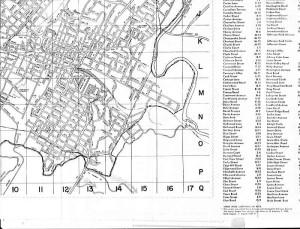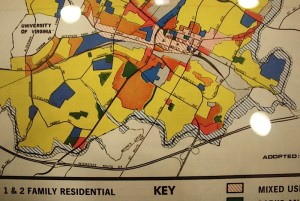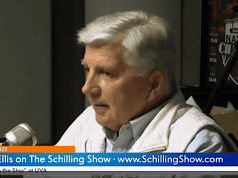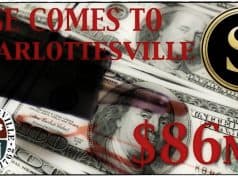(Note: This is an open letter to Charlottesville City Council from guest editorialist Antoinette W. Roades)
To: Members of Charlottesville City Council
From: Antoinette W. Roades
Date: 1 May 2012
Re: Your plan to give away 20 percent of Oakwood Cemetery
Given City practice over the last few years, what you are poised to do on 7 May could appear unremarkable. Again and again, you have given favor to Charlie Armstrong. And more and more, you have made only slight pretence of public process in proceeding with whatever you have already decided to do. (N.B. I can find no one who knew anything of a year-ago charette cited as neighborhood endorsement of development on the property involved. But even had my neighbors and I taken part in such a thing, we would not consider as endorsement a discussion of hypothetical projects between self-selected participants to constitute public process under law.) However, on brief investigation — the only sort of investigation possible given your unseemly rush to deliver the City’s latest gift — it becomes clear that the current situation is remarkable. It is remarkable because of the wrongs that have already been done. It is remarkable because of the wrongs that will be done if you persist.
Most recent among the wrongs done has been the misrepresentation of this property to the public and the press. And perhaps to you as well? It has been described as a problematic piece of land the City just happens to own “near Oakwood cemetery,” a piece with which something has long needed to be done, a dump worthy only of giveaway to what Councilors deem a worthy “vision” (albeit a “vision” even its submitter calls only conceptual). In fact, the property — which carries an assessed value of $370,700 despite its alleged worthlessness — is part of Oakwood cemetery, a part made up of public land purchased systematically by public officials with public money for the public purpose of expanding the City’s otherwise limited public cemetery space. And further inquiry reveals that this public land in a public cemetery should have been opened long ere now to the burials for which it was purchased. As for its being degraded in any degree, inquiry reveals that any such degradation is the direct and deplorable result not just of City neglect, but of active City abuse.
BACKGROUND
Our larger community — that is, both the City of Charlottesville and County of Albemarle — has only two public cemeteries, Maplewood and Oakwood, both of which lie in the City and fall under the jurisdiction of the Parks and Recreation Department. Both cemeteries were established in the 19th century — Maplewood earlier, Oakwood later. By the early 20th century, Maplewood was hemmed in by streets and residences that left it no potential for expansion. Oakwood, however, had potential for expansion, potential recognized by two sets of far-sighted and responsible City officials who secured additional land via two transactions.
By deed of 13 October 1944 (Charlottesville Deed Book 118, page 191; plat in CDB 20, page 289), the City acquired what is now Tax Parcel 29-266. Then, by deed of 29 March 1957 (CDB 198, page 61; plat in CDB 92, page 124), the City acquired what is now Tax Parcel 29-272.1. Both purchases reflect deliberation. Both occurred in difficult times when seemingly more important matters could claim public officials’ attention. The first occurred during World War II. The second occurred during the conflict over school desegregation. But as the deeds and related documents show, both occurred as soon as the property in question became available because of changes within the Gleason family, long residents of Ridge Street. (Note: The apparently low prices that the always public-spirited Gleasons set on their land further suggest that they were supportive of the purpose for which the City was making the purchase — yet another reason to honor that purpose.)
City officials of 1944 and 1957 obviously considered providing sufficient public burying ground to be a significant responsibility. Even that long ago, they foresaw a time when the burial capacity in the City cemeteries as then bounded would be exceeded. And documents show that at least some of those officials’ successors understood their intention and the property’s dedication. Two such items are attached. One is a Charlottesville map of 1963 published by National Bank but based, of course, on official surveys. It shows Oakwood’s boundaries inclusive of the parcels you are poised to give away. The other is a City Planning Department map of 1979 that projects land use for 1990. It also shows Oakwood inclusive of those two parcels. (The color blue denotes public use.) And I would add on an anecdotal note that no one I have raised this matter with — including former City Councilors — ever thought that the open land immediately west of Oakwood’s westernmost drive was anything but part of the cemetery.
Today, Maplewood appears to be full, and inquiry reveals that it is, in fact, “closed” because all available plots have been purchased. Indeed, it turns out that all its plots had been purchased by at least 20 years ago. Oakwood appears to have space remaining even east of its westernmost drive. In fact, however, it is also considered “closed” because all available plots east of Tax Parcels 29-266 and 29-272.1 have been purchased. But Oakwood should not be closed because Oakwood has more space — three-and-a-half acres more space that should have been opened for burials at least ten years ago if not earlier.
Instead of opening the land for the purpose for which it was purchased and needed, however, City officials allowed it to become a dumping site — that is, an illegal landfill — for assorted detritus hauled by City workers at the direction of City supervisors. That detritus, according to Jim Tolbert, has accumulated to a depth as measured by core samples of 20 feet. (Of course, any private landowner who had done the same thing at the same time would have been required to clean the property up under penalty of law. Failure to do so could have netted a fine, jail time, or both.)
SITUATION NOW
The repercussions of the City’s failures in regard to Oakwood vary. At a personal level, families of limited means who have needed public cemetery burial as well as families that may have considered Oakwood their traditional burial site have been forced to go not only elsewhere but onto the commercial cemetery market. At a community level, the natural flow of burials that makes of public cemeteries particularly valuable three-dimensional family albums and museums of local history has been cut off. And at a humanitarian level, the centuries-old community practice of providing burial ground for indigents, unknowns, and other unfortunates has been abandoned leaving a matter of civic compassion to the charity of churches.
The City’s official webpage for Oakwood says: “Oakwood Cemetery has been Charlottesville’s primary public cemetery since the latter half of the 19th century when Maplewood Cemetery began to reach its maximum capacity. It was also the primary burying ground for the poor and indigent. The first recorded indigent burial took place there in February of 1883 — that of “Sophie Shepherd’s child,” a local pauper. The cemetery still has a ‘Potter’s Field,’ a colloquial term for cemeteries used for individual burials of the poor. Such cemeteries, or sections of cemeteries, have existed throughout history as places for those who could not afford a grave or family vault.”
But the cemetery does not still have a Potters Field and has not had one for some time. So the statement on the City’s official website is untrue. (Note: This means among other things that should a resident of The Crossing or a client of The Haven die without means for private burial in a private cemetery — an event that can easily be foreseen — that person will again be homeless, something that would not have happened before Oakwood was declared “closed.”)
When I began this hurried inquiry, I thought the current situation might be attributed to mere reprehensible carelessness. During the time the Oakwood additions were made, public officials focused on being good stewards of public resources and providing basic amenities to the citizenry. However, in the last couple of decades, public officials have focused more and more on imposing on the citizenry the latest fads in politics and planning and providing public resources to private interests. Also, because the deaths of individuals rarely become public matters, the City’s failure to open the additional public burial space already provided for might easily elude public notice.
In the last couple of days, however, I have learned that employees of at least two (and probably three) City departments saw this situation developing and made their concerns known. And I have been told that at least some of those concerns were conveyed to City Council. So I am now forced to attribute the current situation to systemic incompetence, serial hypocrisy (vis-à-vis civic compassion), and calculated misrepresentation.
An analogy comes to mind — that is, declaring South Fork Reservoir worthless because silt that should have been dredged as a matter of course reduced its capacity below that for which it was designed. For the two situations to be truly analogous, however, City workers acting at their supervisors’ direction would also have to have dumped into the reservoir tons of debris rendering even the water it can hold unusable.
LOOKING AHEAD
Were blame to be assessed in this case at this moment, several generations of officials and employees would have to share it. But if you persist in giving 20 percent of the City’s public Oakwood Cemetery to Charlie Armstrong — who, of course, has shown unconscionable contempt for Hawkins family remains on the Ridge-Cherry property, contempt reinforced by the City Attorney’s directive to officials not to acknowledge the issue even for discussion — you will assume as entirely your own the blame for permanent denial of access by this community’s needy families, indigents, et al., to a basic amenity that your far-sighted predecessors acted to secure to them.
In my opinion, you have no legal right to do as you plan. If you persist you should be taken to court. I do hope, however, that you respond instead to the civic-minded ghosts of Charlottesville’s past — just the sort we should be honoring on the City’s 250th birthday — by restoring to current and future members of this community what already belongs to them.
Please do that. Thank you.










Excellent report, however odd are this is a done deal. In City Council eyes there is alway someone else land we can take if needed.
This is an outstanding report. Please follow-up
with the results of Council’s actions.
Superb Article, it helps me a lot.
What is the City’s policy for indigent burials? Does Jim Tolbert have a plan?
With respect to Ms. Rhoades, while her complaints about secrecy appear to have merit, her editorial makes it sound like the land deal is a giveaway to Charlie Armstrong. Nowhere do we find mention of the group that will actually use the land, Habitat for Humanity. That’s Tea Party conservatism for you: praise the Lord and protect our property rights, and let the poor, whom Jesus never mentioned, fend for themselves.
Ken —
Ms. Roades is neither a “Tea Party conservative” nor a Fill-in-the-Blank Liberal. She is an independent in all things and a firm believer in facts.
Re who “will actually use” the 3.5 acres of cemetery land sold for $10 (i.e. given away) by four-to-one City Council vote on the 7th: In this people-depriving deal, Habitat for Humanity is the junior partner to Southern Development — a company fronted by Charlie Armstrong. Southern Development will build the greater number of units, use the greater part of the land, and make a profit on what it builds.
Further, the SD-Habitat proposal calls for incorporating land of adjacent owners into the project and thereby enlarging it. That adjacent land belongs to former Mayor Blake Caravati, a developer and contractor, and former City Council candidate Brevy Cannon, a U.Va. employee, who had submitted their own proposal using Piedmont Housing Alliance to camouflage their profit-making motive. Caravati was actually the first to float the notion of building on the cemetery expansion area because he wanted to increase the value of his surplus property. His proposal would also incorporate land on which burials have already taken place — land from which the proposal calls for exhuming bodies and moving them elsewhere.
Re the poor, my mention of whom you seem to have missed: As I said, because all of Oakwood’s east side plots have been sold, the poor and indigent have had to rely on the charity of churches and that will remain the case unless the land purchased for cemetery expansion is returned to the cemetery. (And Jim Moore: I have been told by City employees that over the years both Parks & Recreation staff and Social Services staff raised concerns about the lack of burial sites for the neediest. I was also told that those concerns were brought to the attention of City Council. But no one appears to have had in the past or to have now any plan, unless one counts Jim Tolbert’s plan to say and do anything it takes to secure abundant City resources to Charlie Armstrong and Southern Development.)
It should be noted that the people who have the greatest need of genuinely affordable housing — which I distinguish from formula-defined “affordable housing” — are the same people who have the greatest need of affordable burial sites. And given that their limited means limit their options in multiple ways, they have special need of the dignity and amenity of a proper burial. Also note, an expanded Oakwood Cemetery would serve literally hundreds more families than would Habitat’s small participation in what has been proposed. (Note, too, re genuine affordability: Neither Habitat nor PHA has ever built anything that I could afford.)
But whether Habitat is wonderful and does good work or not should be completely irrelevant to this situation. The fact is that two forward-looking sets of public officials purchased land in 1944 and 1957 to provide extra burying ground for families at Oakwood far into the future. The fact is, too, that need for that extra burying ground has arisen. And that extra burying ground is very much wanted as well. Under those circumstances, for current City officials to give that land away for any other purpose whatsoever is irresponsible and uncivic in the extreme. And it’s just plain cruel to those who care most about Oakwood.
In recent months, Councilors have apologized to local African Americans for bulldozing Vinegar Hill and displacing hundreds, pledged to remember the lessons of that bulldozing and displacement and never make such an error again, and commissioned a statue (for up to $200,000) to honor those displaced by the bulldozing. And Councilors continued to express great concern for African Americans at their meeting on the 7th, particularly in the matter of arrest, conviction, and sentencing disparities in the application of marijuana laws.
Then, without ever once discussing the issue of Oakwood — which has long been considered by local African Americans their traditional family cemetery and true “sacred ground” (according to former Councilor Holly Edwards) — being full and future African American burials there being foreclosed, Councilors Huja, Norris, Szakos, and Galvin voted to give the land intended for future Oakwood burials to developers who will bulldoze it for building. And according to their proposal, those developers will actually invade the part of the cemetery where burials have already occurred by widening a cemetery drive to function as a City street and also by incorporating into the project the property of other developers who have called for the displacement of already buried people for more building.
All of which is to say that the only “property rights” issue here is the fact that the 3.5 acre property given for a project that will overwhelmingly profit private developers was secured by public officials using public money for public purpose, public purpose for which the public now has both want and need, not to mention right in every sense of that word.
Antoinette, thank you for the detailed reply. You may not be a Tea Partier, but by writing here you’re appealing to Tea Partiers, and if you value facts, it’s best to give people all the facts. When you leave out key facts, people who know them wonder what else you’ve left out, and you’ve lost your power to persuade.
As I said, I understand your anger at how this deal was conducted without community input. I understand your anger at what you call a giveaway (although I don’t agree with the characterization because you left out key facts). And I understand your sentiments about the good intentions of people who bought that land. It’s in regards to the latter that I think you have your priorities backward. Those men bought and purposed the land over a half a century ago, and the living have a right to make their own decisions about what’s best for the community today.
Not to be sarcastic, but if the poor were offered a choice between affordable burial and affordable housing, I think we know what they’d choose. Likewise, if anything deserves to be called irresponsible, uncivic and cruel, is it failing to provide for the needy after death or failing to provide for them in life?
Does anyone actually go unburied for lack of funds anyhow? Plenty of people do live in sub-standard housing. This project will provide people with help they actually need, help they would not find elsewhere, not help they would. No doubt many of these people will be African-American, so the project hardly compares to the bulldozing of Vinegar Hill.
Ken —
First, if you would note, I did not “write here.” I wrote to City Councilors and allowed Rob Schilling, who offers a widely eclectic forum, to post my letter to them.
As for what any given family or or any given individual would choose if given the option of either a house or a grave, but not both: That’s an artificial choice that has nothing to do with the situation at hand.
And as for the idea that any generation is entitled to override at will or whim the planning and provisions of earlier generation: Were governments to conduct themselves accordingly nothing and no one would ever be safe. Indeed, by that logic, Councilors could have, and probably should have, given the entire cemetery — its existing graves and all — to Habitat to plow up and build on. How could they possibly allow even one dead person to lie in the way of a living one?
Once more: Habitat is the junior partner — one who will not be “housing” “many” people of any income or ethnicity if this travesty becomes reality — in the very good deal dealt Southern Development and about to include Blake Caravati and Brevy Cannon. Nor, given Habitat’s prices, is anyone likely to move from “substandard housing” to one of its units. More genuinely affordable housing can be found in the general real estate listings.
Also, as has been demonstrated over recent years, Habitat can build anywhere and therefore has nothing remotely resembling cause or justification to take from the people property that has particular meaning and resonance for them, property that represents a long tradition for both individual families and the community of which they are part, property that was purchased for their use with public money dedicated to specific public purpose. Indeed, if Habitat were true to the deeply moral vision of its founders, it would repudiate this tainted deal that will cause distress to so many and shift its sights elsewhere.
Antoinette, Rob’s callers are overwhelmingly people for whom someone like David Brooks is a RINO, so his blog readers are probably the same. I take your point that you first offered your opinion elsewhere.
The choice I posed was artificial, yes. It’s a telling hypothetical. I did not say that any generation is entitled to override at will or whim a previous generations . . . etc. We owe the dead gratitude and respect. We don’t owe them slavish obedience. We have a right and responsibility to consider their wishes, but not to automatically follow them, I think you’ll agree. Otherwise, I could take your point to a silly extreme like you’ve taken mine and say that according to your idea, we should never make changes previous generations wouldn’t have.
The Habitat project will help many people over time, inter-generationally, by giving the first generation equity/capital, and these are people who as I said, would not find the same help elsewhere. The city selected that particular site, not Habitat, and as I said, I believe the value of helping people outweighs that of burying them.
I can understand people disagreeing, and by the way, I respect your activism, your willingness to stand up for what you believe in, but as I said, all the facts need to be on the table. When you don’t put them there, you sound like an extremist, and in this case, of the Tea Party variety.
Ken:
So where does the dead get buried? Or just pile them up on street somewhere and let mother nature take care of them? I guess city council has the right to do anythings they want and don’t have to answer for it.
votes, Antoinette already answered your question: “because all of Oakwood’s east side plots have been sold, the poor and indigent have had to rely on the charity of churches.” Conservatives always say that private individuals and civic organizations should help the poor, not the government. Government should encourage the private sector to make money. There you go.
And city council has to answer to the voters on Election Day. Obviously.
Ken —
Surely you realize that as an anonymous heckler you are entitled to no credibility and less time. So you have already exceeded your allowance. And your overdraft is aggravated by the ignorance you show of the current Oakwood situation, of the histories of that situation and the parties involved, and of Habitat’s evolution in recent years into a development company like any other. And your complete insensitivity to the importance of cemeteries to the living and their communities further diminishes any deference you might otherwise be due.
An aside: Because you continue to inform me of what I “sound like,” I’ll note that you sound like a flack for real estate and development interests — interests for which the phrase “affordable housing” has become the highly functional equivalent of “abracadabra.”
My statements have been clear, as have been the principles that underlie them. Habitat had nothing whatsoever to do with my writing Council — the only audience for which my letter was intended — or objecting to the land giveaway. Nor was Habitat the reason for Council’s action. It was merely a convenient excuse for Councilors to continue a practice that has become a troubling pattern. Indeed, Council has been showering Southern Development with valuable favor ever since Dr. Charles Hurt invented that subsidiary of his various enterprises in the late 1990s. (N.B. SD has “partnered” with Habitat only since the economic downturn deleted from the development pot all but public money and public resources.) And cronyism has become chronic in Charlottesville government in the last couple of decades.
All cronyism, both in general and as regards SD, has been wrong. But it is uniquely wrong in the current situation because it involves a public cemetery and through it the permanent shutdown of the public cemetery system that the City has maintained for almost two centuries.
I said, I meant, and I repeat that four City Councilors were wrong in every way — practically, morally, even legally — to give to developers land that was bought by public officials with public money for the public purpose of expanding a public cemetery for burials by members of the public. And they were especially wrong (and especially hypocritical) to deprive African American members of the public — for whom they frequently express special concern — of that public burial space because Oakwood Cemetery has become for them especially “sacred ground” as a community family graveyard.
Finis. (But not RIP because the invasion of Oakwood by Southern Development, Habitat, and their soon to be partners Caravati and Cannon — whose plan called for digging up bodies to open more building sites — will make that impossible even for those already dead and buried.)
Surely you realize that as an anonymous heckler you are entitled to no credibility and less time.
Gee, I’ve never heard a heckler make arguments and even give compliments instead of merely throw insults. If I’m not worthy of your time, I won’t tempt you to spend anymore of it, and this will be my last word.
the city council screwed up on this issue. As they have a happen of doing. No they will not be taken to task at ballot box either. As long as they keep handing out citizen’s money to friend. We are screwed. No it is not the Church job to find a piece of ground to put you in. If the land was already set aside for this, than why give it away. Please let get realy here. Graves are not for the individuals who are no longer with us. They are for the living. And city council are telling us alound and clear — we don’t give a d___________ what the citizens need.
votes, you are clearly under the impression that you’re writing in English. Just for the heckuva it some time, paste your comments into Word and run the spelling and grammar check under the Review tab. You’ll be amazed, and there are more mistakes that won’t even catch. I don’t knock you for not being an expert writer, but you could at least make half an effort.